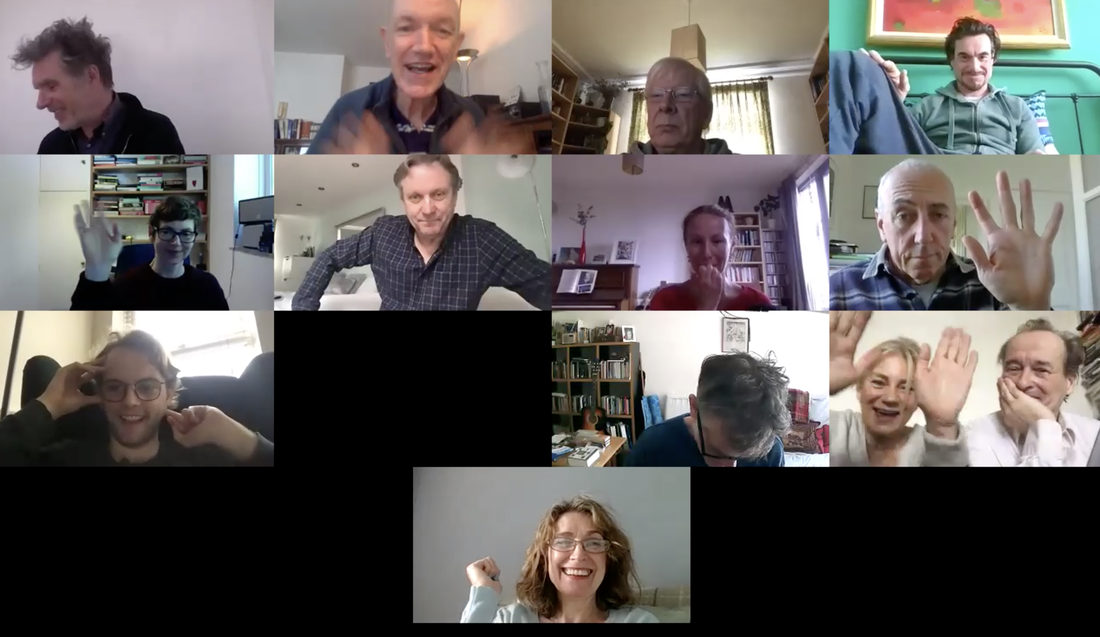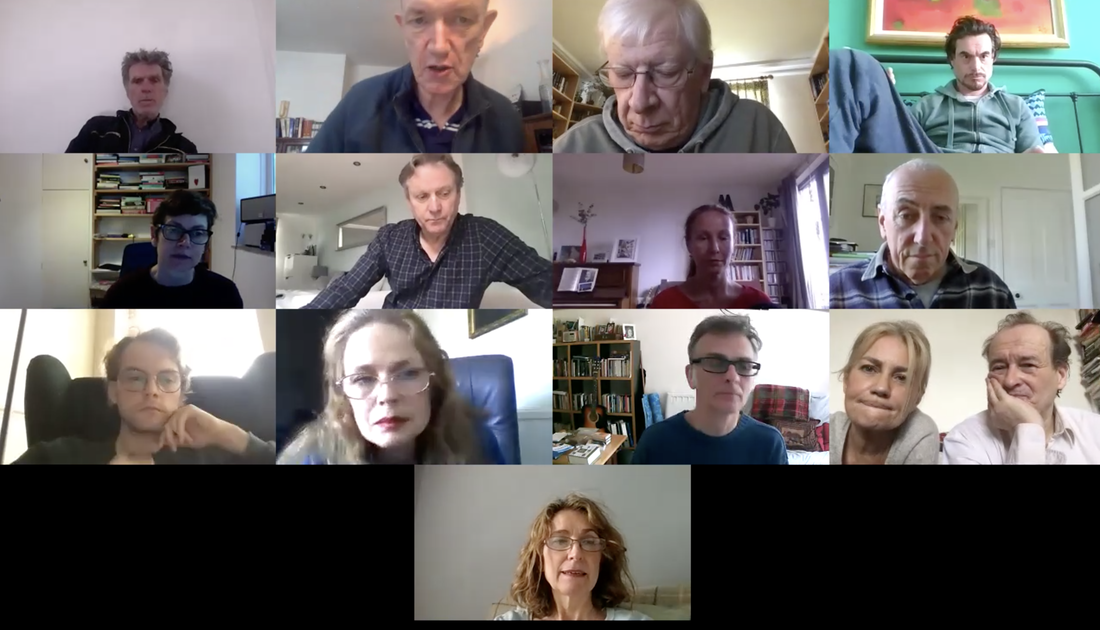|
Present: Julia Barry, Rachel Bavidge, John Chancer, Colin Ellwood, Simon Furness, Valerie Gogan, Paul Hamilton, Marta Kielkovicz, Kevin McMonagle, Rob Pomfret, Adam Tyler, Simon Usher, Julia Whitwood, David Whitworth
One of the best things about the reading group is that participants are discovering the play as they read it aloud. Their response, and the consequent ‘in-process’ fashioning of a performance is therefore largely instinctual and ‘in the moment’. The exhilaration of discovery, and of improvisation, go together. The encounter between actor and text (or role) is almost a collision, and a creative one. Sparks fly, something catches fire, and then the fire can be continually shaped. Not unlike the formal encounter between an actor and a mask: the suddenness, the deliberate 'shock' and the singleness of the moment of ‘recognition’ are necessary to generate the requisite instinctual energy, to provoke bold choices in engagement and realisation. However, here the unfolding text - unlike the mask -continues to provide an ever-evolving flow of new information, allowing the actor to continually modifying the original flame, to pivoting and swerve and re-connect in mid-flight. And it's not just the text that offers the possibility of 'creative collisions': other actors do too when sharing the same role, as regularly happens, so encouraging the actor to instinctually scope the role's broader coordinates and then to ‘dig deep’ to find something different, something unique, something new from deep within. Also, older often gets to play younger, female to play male and so on, so again the ‘connection’ of role with actor can transcend any ‘conventional’ casting. The overall result can be a tessellated quilt of individual insights, owned, held and imagined communally by the group. And , tellingly, none of it really matters: The stakes are ultimately very low, with little or no audience beyond the participants themselves. All present are equally ‘in jeopardy’, all equally invested in and vulnerable to the ‘game’. People take risks, play, and if things don’t fly, nobody minds. There is an ancient-Greek-derived term: ‘phronesis’, meaning a kind of implicit ‘nous’; a spontaneous in-the-moment ability for measured and canny response based on the instinctual absorption of previous experience and the deployment of a trained intuition. The reading group is an exercise in such 'phronetic’ abilities, amplified by the actors' boldness and willingness to fly. It doesn’t always work out like that, but sometimes it does. As perhaps it did in Friday’s session, even though the range and number involved in the ‘tapestry’ of characters in Simon Stephens’s Rage meant that the plan was for each participants to settle a bit more on a single (or couple of) characters for the duration, rather than split and share roles around as is usual Rage is Stephens’s response to a production of Elfriede Jelinek’s play of the same name (‘Wut’ in German), itself a response to the Charlie Hebdo shootings in Paris, seen by him in a production by long-time collaborator Sebastian Nübling (see this live trailer etc. embedded here of a different production at The Deutsches Theater, Berlin): https://www.deutschestheater.de/en/programme/a-z/wut/. Judging by the above, Jelinek’s play is a powerful mix of pure rage, character perplexity and a kind of desperate religious transcendence. Stephens’s response however draws also on a different source: Joel Goodman’s eerily beautiful, painterly, almost-religious photographs of late night New Year revelling in Manchester City Centre: https://joelgoodman.net/2016/12/31/press-photographer-2016-viral/new-years-night-revellers/ ...in which beauty seems dropped-in like a subliminal image, or arisen from an elemental quality within the action itself. It might partly be this full-spectrum emergent humanity, achieved through their subjects' 'full-bodied' sheer body-ness, that underwrites their often-made comparison to Renaissance religious paintings. After all, human beings in full spate, fully and unselfconsciously engaged….are beautiful. Put a group of us/them together, in a given space, all fully and momentarily 'erupting’ or hunkering down to action and something very charged happens. The scenario of Stephens’s play is simple: late New Year’s Eve in a city centre with the characteristics and street names of Manchester. The world is turning and a tapestried flow of apparently continuous but concentrated real-time action arcs in its wake. Young people are the ‘poachers’ of the evening, the hunters, the snufflers for meaning, pleasure, intimacy and transcendence amidst the cracks and fissures of the city and the night. And there is also a smattering of largely phlegmatic ‘gamekeepers’: a quartet of dogged bobbies, a taxi driver, all with their own carefully-incubated issues. SO: lunatics and attendants; incipient nuclear reactions and attenuated carbon rods, all flaming in the high octane ectoplasm thrown on the flames by dint of the occasion. Given its differing source of inspiration, but also surely a function of Stephens’ hugely infectious big-hearted indie-record lyrical richness, Stephens' Rage is not a simple echo of Wut but rather a conversion of its dark anger into something (perhaps) richer, ultimately more uplifting, even borderline transcendant. With him, here, the rage is a calling card, a token of admission, a deferential tipping of the hat to Jelinek, but then, like a good jazz improvisor, Stephens takes Jelinek’s ‘offer’ and transforms it. His battle-casualties of the night staggering and wandering around the city centre are caught more often in moments of stillness, self-confrontation, mutual support or unexpected intimate connection than in full-on aggressive attack mode. The most extraordinarily offensive (and endlessly-inventively-offensive) invective is sometimes deployed, but more as - in an entirely unsentimental way - a symptom of individual need and lovelessness or childlike need to be naughty, to joyously let rip at the universe, transgressing with whatever ammunition is to hand. Here is a logorrhoeic vomiting to match the very salient actual vomiting; an expulsion of societal toxins rather than a reinforcement of them. As the year turns we witness friends dealing with buried traumas; a girl in a sparkly dresses unexpectedly declares love and then proposes to her best friend; a crack in a nondescript wall offers a glimpse of a kind of localised underworld, a Mancunian Nirvana where the dead frolic in miniature, un-reachable but happy. The city centre has become a magic place for the night. Stephens clearly has huge empathy for all his characters, gamekeepers and poachers alike. All are lovingly fashioned and fettled for their individually-customised apotheoses of excess, their extravagent demonstrations of verbal and physical creativity and their sheer joyous Rabelasian, life-affirming slurpy gusto and verve. By means of their linguistic, physical and emotive abundance, the play manages to be both intimate and extravagantly operatic; realist AND poetically transcendent; a joyous clearing of the societal throat; an alchemic transmutation of rage into dreams. On Friday the experience of reading the play seemed to bring huge delight to all who were there. The participants - often in this case inevitably more 'mature' than the roles they took of course - brought phronesis in abundance, playing with delicacy, poise, insight and love, as we hope the following short video extract will demonstrate:
https://vimeo.com/414296771/18f0cc615f
1 Comment
Anna Mors
4/5/2020 04:36:50 pm
Fantastic recording! Really enjoyed it, and wish could have been present at the reading!
Reply
Leave a Reply. |
INDEX of dates:
INDEX of playwrights and plays:
INDEX of contributors:
|


 RSS Feed
RSS Feed
